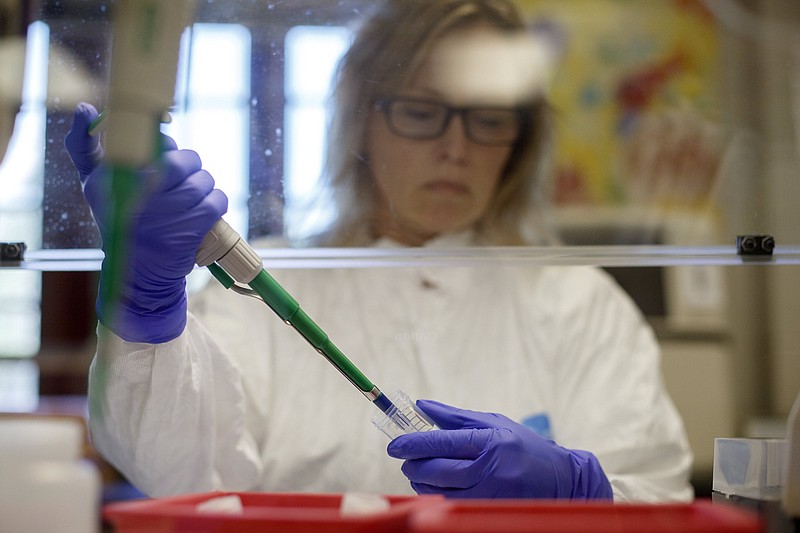Omicron is here. Omicron is the new and still mystery-shrouded variant of concern in the ever-evolving coronavirus.
Well, drat! And of course, it's here. We have to wonder if it hasn't been here for at least a couple of weeks. Even on Dec. 4, we knew it was in 13 states, including our neighbor to the south - Georgia whose state line borders Chattanooga and much of Southeast Tennessee.
Perhaps the only real reason that we weren't reporting it here earlier was that Tennessee simply hasn't been doing enough testing - and specifically viral genetic sequencing to distinguish one COVID-19 variant from another among our local virus samples.
The medical and government messaging about omicron is confusing at best.
The general talking points - at least today - are that it spreads much faster than delta (omicron's prevalence jumped seven-fold in a single week, according to the Centers for Disease Control and Prevention) but early data indicates it may be milder, especially for vaccinated and boosted - we stress here, boosted - people.
The fly in this ointment, of course, is that 200 million people (61%) in the U.S. are vaccinated, and of those 200 million, only 55 million are boosted. In Tennessee and Georgia, only about 50% of us are fully vaccinated. Of Tennessee's fully vaccinated, about 40% have received boosters, according to the Tennessee Department of Health's website.
Sequencing our contagion to determine its variant is not part of the usual "positive" or "negative" COVID testing.
But it should be. The CDC recommends sequencing 5% of all positive COVID-19 samples. At the end of November, Tennessee had sequenced 1.95% of its samples, placing us among the states conducting the lowest rate of sequencing.
If we don't know the enemy and how many of them there are, how do we defend ourselves? Surveillance for viral variants is necessary to answer important questions, including whether current COVID-19 tests or treatments are still viable or if vaccines need to be tweaked.
Certainly, one easy answer is vaccinate, boost, do less travel during the holidays and be more consistent about wearing masks.
But we know that's not likely to happen. People are tired of the pandemic, tired of missing their families and are tuning out public health messages. What's more, around here too many people are stubbornly resisting preventive measures, following the lead of our supermajority Republican state elected officials who've mandated against mandates and don't want to see the Biden administration's common-sense requirements bring about perception of any sort of victory for Democrats - even if it means public health suffers.
Meanwhile, the American COVID death toll stands at more than 803,000. Tennessee tallied almost 18,000 deaths, Georgia counted almost 26,000 and Hamilton County reported 733. Our two states together have reported about 2.3 million people sickened.
American hospitalizations are on the rise again, still driven largely by the delta variant - the one that used to be the most highly contagious COVID variant. Now the omicron variant is gaining a foothold.
"Our delta surge is ongoing and, in fact, accelerating. And on top of that, we're going to add an omicron surge," said Dr. Jacob Lemieux, who monitors variants for a research collaboration led by Harvard Medical School.
"That's alarming, because our hospitals are already filling up. Staff are fatigued," leaving limited capacity for a potential crush of COVID-19 cases "from an omicron wave superimposed on a delta surge," he told The Associated Press.
Globally, more than 75 countries have confirmed cases of omicron. In the United States, 36 states have detected the variant, which has a large number of worrisome mutations. Hints are emerging that it may be better at evading both vaccines and treatments, leaving Lemieux to say there may be fewer tools to fight it. Some monoclonal antibody treatments don't work as well against omicron in lab tests.
Earlier this month, in a Times Free Press story about omicron sequencing, we talked with Elizabeth Forrester, founder and technical director at Athena Esoterix, the only lab in the Chattanooga region conducting sequencing for coronavirus variants - and the lab that found omicron here this week. She said the lab is not doing nearly as much sequencing as it could.
The lab currently foots the bill for all coronavirus sequencing, she said, so it only sequences samples that appear especially concerning, such as a large cluster of cases among vaccinated individuals at a nursing home. Athena Esoterix is capable of conducting more sequencing, but it would need more political will behind the effort, she said.
"If the community wants it, then we have to figure out how to fund it, and we have to make it a priority locally, because we're not going to get the information otherwise," Forrester said, adding that the county hasn't sought available federal funds that would allow the lab - and us - to expand coronavirus sequencing in the Chattanooga region.
Make no mistake, folks. The funding is available, to the tune of $1.7 billion through the CDC, local and state governments via the Biden administration's American Rescue Act passed in March.
So where's that political will? Make the folks you elected show some. Make them hear you.
